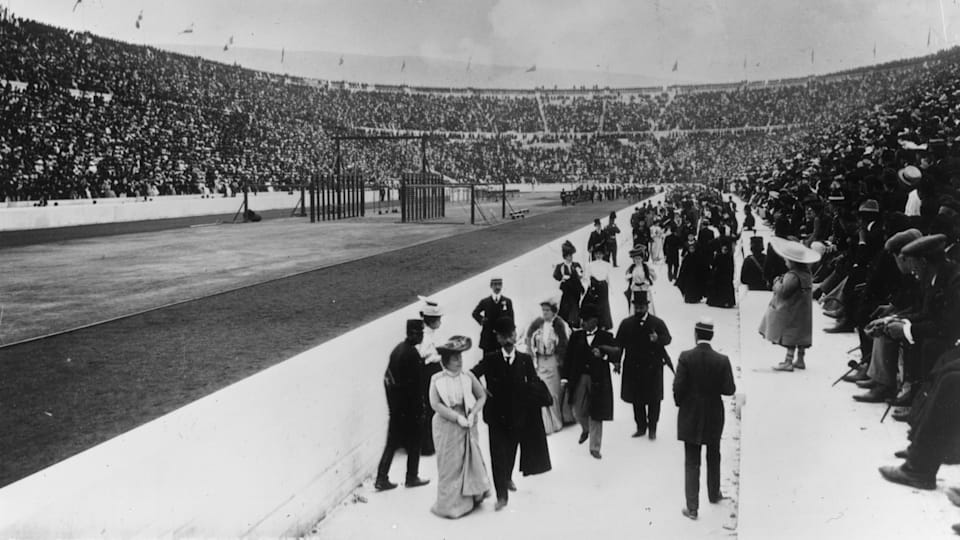Australia's Olympic debut: Athens 1896 sets up a lasting legacy
Australia first competed at the Olympics at Athens 1896. Edwin Flack, or Teddy, was Australia’s first Olympian. He won three medals in the inaugural Summer Games.

Australia's association with the Olympics dates back to the first edition of the modern Summer Games - Athens 1896.
The 1896 Games, opened in front of 80,000 spectators at the Panathenaic Stadium, saw 241 athletes from 14 countries, including Australia, compete in 43 medal events.
Competitions were held in nine sports - athletics, cycling, fencing, weightlifting, wrestling, swimming, tennis, shooting and gymnastics.
Athens 1896: Australia’s first Olympics
Victoria’s Edwin Flack, a 22-year-old multi-sport athlete who worked as an accountant in London, was the only Australian athlete at the inaugural modern Olympics in 1896 held in the Greek capital.
Flack, who was also well-known by his nickname Teddy, competed in athletics and tennis at the 1896 Games and earned the distinction of being Australia’s first Olympian. He is also Australia’s first Olympic medallist.
Teddy’s remarkable performance at Athens saw him win gold medals in the men’s 800m and the 1500m track events and a bronze in the men’s doubles tennis event with his English friend and partner George Robertson.
Flack also participated in the marathon and led the race for a good part before collapsing due to exhaustion about six kilometres from the finish line.
One of the most notable athletes at the Athens 1896 Summer Games, Teddy’s achievements endeared him to Greek fans and earned him the moniker of ‘Lion of Athens’.
Australia's Edwin 'Teddy' Flack in a picnic with other medal winners from the Athens 1896 Olympics.
Australia’s Olympic legacy built on Athens 1896
The legacy of Edwin Flack and the early Olympians continued to inspire the next generations of Australian athletes. Following Flack's achievements, Australia's presence and success in the Olympics grew consistently.
The nation sent athletes to compete at the Games in 1900 and 1904 and also won medals. London 1908 and Stockholm 1912 saw Australian athletes compete under the common Australasian flag alongside trans-Tasman neighbours New Zealand.
Antwerp 1920 was the first time when Australia competed under their own flag. George Parker was the first Australian flag-bearer at the Olympics. Parker won silver in the men’s 3000m but was unable to complete the 10000m race.
Australian athletes continued to take significant strides in various sports but their performances stood out in swimming, athletics and in team sports like hockey, later on.
The establishment of national sports bodies in the early 20th century contributed to the improved performance of Australian athletes at the Games and established its proud sporting culture.
Australia at the Games in the post-war era
The post-World War II period marked a significant era of growth for Australia in the Olympics. The Melbourne 1956 Olympics were a landmark event as Australia hosted the Games for the first time.
This period also saw Australian athletes making their mark across various disciplines, including swimming, athletics, and cycling. Swimming remains Australia’s best Olympic sport. Swimmers Dawn Fraser and Murray Rose and track-and-field athlete Betty Cuthbert became household names by winning multiple Olympic medals.
Over 3,000 athletes from 72 countries took part in the 1956 Games in 145 medal events. Australia, with 13 golds and an overall tally of 35 medals, came third for their best standing at the Olympic Games.
It was the first Summer Games held outside of Europe and North America and played a huge role in globalising the Olympic movement. Moreover, it was the first Games to embrace the power of live television broadcasts.
In the contemporary era, Australia have established itself as one of the most successful countries at the Olympics, with consistent successes.
The Sydney Games, Australia’s second time hosting the Summer Games, saw over 10,000 athletes from 199 countries taking part in 300 medal events. Australia’s contingent of 632 athletes remains their biggest ever in their Olympic history.
The then-IOC President Juan Antonio Samaranch declared the Sydney Olympics the “best ever” at the closing ceremony. The momentum from the success at the Sydney 2000 Games was evident across all levels of sports in Australia over the next two decades.
The nation collectively took steps to ensure that participation in sports at all levels continued to stay competitive.
Australia also performed well at the subsequent Summer Games and are all set to host the Olympics for the third time with the Brisbane 2032 Games.
